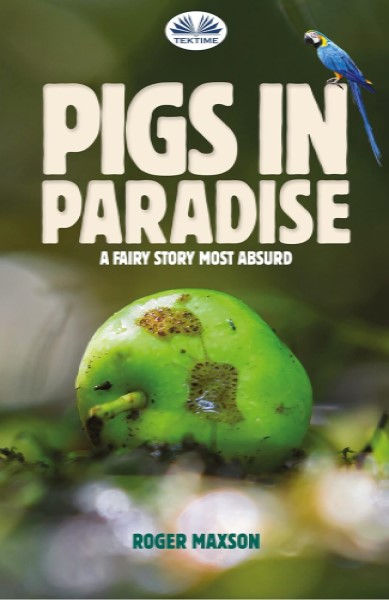Reviewed by Jacquelyn Tolksdorf
Roger Maxson’s Pigs in Paradise: A Fairy Story Most Absurd is a satirical novel that delves into the complex interplay between religion and politics in America. Drawing inspiration from George Orwell’s Animal Farm, Maxson crafts a narrative that is both absurd and thought-provoking, tackling serious themes with a blend of humor and literary critique. Purchase Here.
The story is set in a world where animals are anthropomorphized, engaging in behaviors and dialogues that mirror human societal and political interactions. The protagonist, Mel, navigates through a series of events involving various animals, each representing different facets of society and religious sects. The narrative is divided into two books, encompassing a range of episodes that highlight the absurdity and contradictions in religious and political practices. Maxson’s novel is an unabashed critique of American evangelicalism and the influence of religion on politics.
Through the use of animal characters, he explores themes such as freedom of expression, the nature of belief, and the often hypocritical stance of religious leaders. The author does not shy away from controversial topics, aiming to provoke thought and discussion among his readers.
The use of satire is central to the book’s appeal. Maxson employs a witty and sometimes biting tone to expose the irrationalities and abuses within religious institutions. The dialogue between characters often serves as a vehicle for the author’s philosophical musings, questioning the very
foundation of organized religion and its role in shaping societal norms.
The characters in Pigs in Paradise are richly drawn, each symbolizing different aspects of society. Mel, the protagonist, represents the everyman, caught in the tumultuous currents of political and religious ideologies. Other notable characters include:
● Boris, a charismatic leader (a boar) whose actions reflect the manipulative tendencies of political figures.
● Ezekiel and Dave, ravens who provide a cynical commentary on the events unfolding around them.
● Julius, a parrot whose artistic talents and subsequent recognition serve as a metaphor for the struggle for individuality in a conformist society.
Maxson’s writing is both engaging and intellectually stimulating. His prose is marked by sharp wit and a keen eye for detail. The narrative flows smoothly, with each chapter building upon the previous one to create a cohesive and compelling story. The dialogues are particularly noteworthy, often laced with irony and dark humor that underscore the book’s satirical nature.
Roger Maxson’s Pigs in Paradise is an exceptional piece of satirical literature that not only entertains but also provides deep insights into the complexities of religious and political life. It stands as a testament to the power of satire in addressing and critiquing societal issues.
For those interested in exploring the intricate world of Pigs in Paradise, the book promises a journey filled with laughter, reflection, and a deeper understanding of the absurdities that pervade our world

First Place – Humor/Satire
